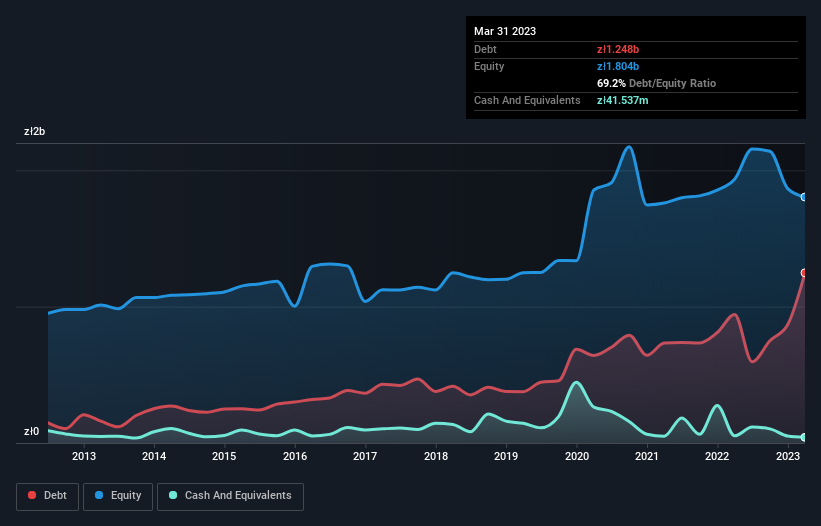Is Grupa Azoty Zaklady Chemiczne Police (WSE:PCE) A Risky Investment?

Some say volatility, rather than debt, is the best way to think about risk as an investor, but Warren Buffett famously said that 'Volatility is far from synonymous with risk.' So it might be obvious that you need to consider debt, when you think about how risky any given stock is, because too much debt can sink a company. As with many other companies Grupa Azoty Zaklady Chemiczne Police S.A. (WSE:PCE) makes use of debt. But should shareholders be worried about its use of debt?
When Is Debt A Problem?
Debt assists a business until the business has trouble paying it off, either with new capital or with free cash flow. Ultimately, if the company can't fulfill its legal obligations to repay debt, shareholders could walk away with nothing. However, a more common (but still painful) scenario is that it has to raise new equity capital at a low price, thus permanently diluting shareholders. Having said that, the most common situation is where a company manages its debt reasonably well - and to its own advantage. The first thing to do when considering how much debt a business uses is to look at its cash and debt together.
See our latest analysis for Grupa Azoty Zaklady Chemiczne Police
How Much Debt Does Grupa Azoty Zaklady Chemiczne Police Carry?
The image below, which you can click on for greater detail, shows that at March 2023 Grupa Azoty Zaklady Chemiczne Police had debt of zł1.25b, up from zł943.2m in one year. On the flip side, it has zł41.5m in cash leading to net debt of about zł1.21b.

How Strong Is Grupa Azoty Zaklady Chemiczne Police's Balance Sheet?
The latest balance sheet data shows that Grupa Azoty Zaklady Chemiczne Police had liabilities of zł2.02b due within a year, and liabilities of zł679.2m falling due after that. Offsetting these obligations, it had cash of zł41.5m as well as receivables valued at zł630.3m due within 12 months. So its liabilities outweigh the sum of its cash and (near-term) receivables by zł2.02b.
Given this deficit is actually higher than the company's market capitalization of zł1.47b, we think shareholders really should watch Grupa Azoty Zaklady Chemiczne Police's debt levels, like a parent watching their child ride a bike for the first time. In the scenario where the company had to clean up its balance sheet quickly, it seems likely shareholders would suffer extensive dilution.
We use two main ratios to inform us about debt levels relative to earnings. The first is net debt divided by earnings before interest, tax, depreciation, and amortization (EBITDA), while the second is how many times its earnings before interest and tax (EBIT) covers its interest expense (or its interest cover, for short). The advantage of this approach is that we take into account both the absolute quantum of debt (with net debt to EBITDA) and the actual interest expenses associated with that debt (with its interest cover ratio).
Grupa Azoty Zaklady Chemiczne Police shareholders face the double whammy of a high net debt to EBITDA ratio (8.6), and fairly weak interest coverage, since EBIT is just 0.65 times the interest expense. The debt burden here is substantial. Worse, Grupa Azoty Zaklady Chemiczne Police's EBIT was down 93% over the last year. If earnings keep going like that over the long term, it has a snowball's chance in hell of paying off that debt. The balance sheet is clearly the area to focus on when you are analysing debt. But it is Grupa Azoty Zaklady Chemiczne Police's earnings that will influence how the balance sheet holds up in the future. So when considering debt, it's definitely worth looking at the earnings trend. Click here for an interactive snapshot.
Finally, a business needs free cash flow to pay off debt; accounting profits just don't cut it. So we clearly need to look at whether that EBIT is leading to corresponding free cash flow. Happily for any shareholders, Grupa Azoty Zaklady Chemiczne Police actually produced more free cash flow than EBIT over the last three years. That sort of strong cash generation warms our hearts like a puppy in a bumblebee suit.
Our View
On the face of it, Grupa Azoty Zaklady Chemiczne Police's interest cover left us tentative about the stock, and its EBIT growth rate was no more enticing than the one empty restaurant on the busiest night of the year. But at least it's pretty decent at converting EBIT to free cash flow; that's encouraging. Overall, it seems to us that Grupa Azoty Zaklady Chemiczne Police's balance sheet is really quite a risk to the business. For this reason we're pretty cautious about the stock, and we think shareholders should keep a close eye on its liquidity. When analysing debt levels, the balance sheet is the obvious place to start. But ultimately, every company can contain risks that exist outside of the balance sheet. For example, we've discovered 1 warning sign for Grupa Azoty Zaklady Chemiczne Police that you should be aware of before investing here.
If you're interested in investing in businesses that can grow profits without the burden of debt, then check out this free list of growing businesses that have net cash on the balance sheet.
New: Manage All Your Stock Portfolios in One Place
We've created the ultimate portfolio companion for stock investors, and it's free.
• Connect an unlimited number of Portfolios and see your total in one currency
• Be alerted to new Warning Signs or Risks via email or mobile
• Track the Fair Value of your stocks
Have feedback on this article? Concerned about the content? Get in touch with us directly. Alternatively, email editorial-team (at) simplywallst.com.
This article by Simply Wall St is general in nature. We provide commentary based on historical data and analyst forecasts only using an unbiased methodology and our articles are not intended to be financial advice. It does not constitute a recommendation to buy or sell any stock, and does not take account of your objectives, or your financial situation. We aim to bring you long-term focused analysis driven by fundamental data. Note that our analysis may not factor in the latest price-sensitive company announcements or qualitative material. Simply Wall St has no position in any stocks mentioned.
About WSE:PCE
Grupa Azoty Zaklady Chemiczne Police
Grupa Azoty Zaklady Chemiczne Police S.A.
Good value with mediocre balance sheet.

